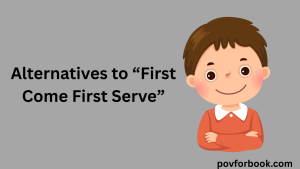Let’s say you’re hosting an event. You’ve got limited seating. Or maybe you’re running a giveaway on social media, releasing a new product, or offering special pricing to early buyers.
You want to let people know: if they act fast, they’ll get the benefit — if they wait, they might miss out.
The default phrase? “First come, first serve.”
But here’s the problem:
It’s overused, sometimes confusing, and even grammatically incorrect unless you’re adding the “d” to say “first come first served.”
So what do you say instead?
That’s exactly what this article will answer. Below, you’ll find 15 better, smarter, clearer alternatives to “first come, first serve.” Each phrase is broken down by:
- What it means
- When to use it
- Real-life examples
- Subtle nuances and tone differences
Whether you’re writing an email, a flyer, a business policy, or a casual text — you’ll walk away with clear, professional, and creative alternatives that fit your situation perfectly.
What Does “First Come, First Serve” Mean — And Why Rethink It?
Before we dive into the alternatives, let’s understand the meaning and why people often want to replace it.
Definition of “First Come, First Serve”
The phrase means that whoever arrives or acts first will get the benefit first — whether that’s a seat, a reward, a product, or a limited opportunity.
However, the more grammatically correct version is: “First come, first served.”
The idea is that those who come first are served first — it’s passive voice.
Why Replace It?
- It can sound informal or lazy in professional writing.
- The grammar confuses people — especially in written contexts.
- It lacks tone flexibility — there are no emotional cues, urgency levels, or branding.
- It’s everywhere — which makes it easy to ignore.
When Should You Use an Alternative?
Let’s say you’re working on any of the following:
- An event invitation with limited capacity
- A discount offer valid only for early buyers
- A public notice about ticket availability
- A marketing email announcing a new release
- A hiring notice with limited job slots
- A reminder for students registering for a class
In these cases, saying something more specific than “first come, first serve” gives your communication an edge. It can build excitement, create urgency, and convey professionalism — all at once.
15 Powerful Alternatives to “First Come First Serve” With Explanations, Contexts, and Examples

1. “Available While Supplies Last”
Why it works:
Creates a sense of scarcity and urgency. Commonly used in retail and e-commerce.
When to use:
- Product launches
- Flash sales
- Limited-time offers
Example:
“Order your custom tumbler today — available while supplies last!”
2. “Limited Spots Available”
Why it works:
Directly communicates that there are only a few openings, motivating people to act quickly.
When to use:
- Event registrations
- Online courses or webinars
- Appointments
Example:
“Our free consultation slots are filling up fast. Limited spots available!”
3. “Act Fast — Space is Limited”
Why it works:
Adds an emotional push for immediate action while emphasizing scarcity.
When to use:
- Service promotions
- Early access offers
- Special membership enrollment
Example:
“Want VIP access? Act fast — space is limited!”
4. “Early Bird Gets the Worm”
Why it works:
This idiom adds a friendly, familiar tone while still emphasizing the benefit of acting quickly.
When to use:
- Early bird discounts
- Pre-sales
- Event marketing
Example:
“Sign up by Friday and save 20%! The early bird gets the worm.”
5. “Reserved for the Earliest Responders”
Why it works:
Sounds respectful and exclusive — perfect when you want to maintain a premium tone.
When to use:
- Corporate events
- Personal invitations
- Premium service offers
Example:
“We’re offering priority booking, reserved for the earliest responders.”
6. “Offered to the First [Number] People Only”
Why it works:
Concrete, specific, and clear. People know exactly how fast they need to move.
When to use:
- Product sales
- Email campaigns
- Giveaways
Example:
“This bonus package is offered to the first 50 subscribers only.”
7. “Respond Quickly to Secure Your Spot”
Why it works:
Sounds polite and professional, while creating urgency.
When to use:
- Internal team invites
- Interview scheduling
- HR communications
Example:
“We have limited interview slots next week. Respond quickly to secure your spot.”
8. “Entry Based on Order of Registration”
Why it works:
More formal and policy-oriented. Excellent for professional or educational settings.
When to use:
- Conference sign-ups
- College course enrollment
- Government forms
Example:
“Workshop entry will be based on order of registration.”
9. “Limited Availability — Priority Given to Early Responders”
Why it works:
Clearly spells out the priority rule while sounding professional and fair.
When to use:
- High-demand service offerings
- Internal requests or briefings
- Scholarships or grants
Example:
“There’s limited availability. Priority will be given to early responders.”
10. “Time-Sensitive Opportunity”
Why it works:
Makes the message sound important, exclusive, and urgent — without sounding aggressive.
When to use:
- Consulting services
- Executive-level communications
- Career opportunities
Example:
“This is a time-sensitive opportunity — please confirm your interest at your earliest convenience.”
11. “First to Respond, First to Benefit”
Why it works:
A slightly more refined version of “first come, first serve.” Adds rhythm and clarity.
When to use:
- B2B promotions
- Coaching or mentorship offers
- Startup programs
Example:
“We’re opening five coaching slots this quarter. First to respond, first to benefit.”
12. “Priority Access for Early Registrants”
Why it works:
Adds a feeling of reward — early action equals privileged access.
When to use:
- Membership programs
- Online courses
- Pre-launch offers
Example:
“Priority access is granted to early registrants. Enroll now to beat the rush.”
13. “Respond Early to Guarantee Availability”
Why it works:
Creates a subtle nudge — it’s polite but clear that spots are limited.
When to use:
- Workshops
- Internal meetings
- Educational programs
Example:
“Respond early to guarantee your availability for the hands-on training.”
14. “Offered on a Rolling Basis”
Why it works:
Perfect for recruitment or admissions — communicates that opportunities are filled as applications arrive.
When to use:
- College or internship applications
- Jobs and hiring
- Application-based grants
Example:
“Positions are offered on a rolling basis — early applications are encouraged.”
15. “First-Come, First-Served Basis” (Corrected)
Why it works:
Still the original phrase, but using correct grammar gives it clarity and professionalism.
When to use:
- Any scenario where you still want to use the traditional phrase
- Formal notices, policies, or disclaimers
Example:
“Tickets will be distributed on a first-come, first-served basis.”
Common Mistakes to Avoid When Indicating Limited Availability
1. Being Too Vague
Saying “limited availability” without context doesn’t trigger urgency. Be specific when possible.
2. Overhyping Scarcity
Don’t say “only 10 spots left!” unless it’s true. It can erode trust.
3. Using Jargon or Confusing Language
Avoid corporate-speak. Say what you mean clearly.
4. Not Matching Tone to Audience
“Keep up or miss out!” might work on social media, but not in a company newsletter.
5. Failing to Include a Call to Action
Always tell your audience what to do next — register, reply, click, call, etc.
Tips to Choose the Right Phrase for Your Context
| Need | Best Phrase |
|---|---|
| Sound formal or legal | “On a first-come, first-served basis”, “Entry based on order of registration” |
| Sound casual or fun | “Early bird gets the worm”, “Keep up or miss out” |
| Emphasize urgency | “Act fast — space is limited”, “Available while supplies last” |
| Sound premium | “Reserved for the earliest responders”, “Priority access for early registrants” |
| Be direct and clear | “Limited spots available”, “First [X] only”, “Rolling basis” |
Real-Life Examples: How Businesses and Individuals Use These Phrases
- E-commerce store:
“This limited-edition item is available while supplies last. Once it’s gone, it’s gone.” - Nonprofit organization:
“Volunteering slots are offered on a rolling basis. Apply now to secure your role for the holiday drive.” - Freelancer or coach:
“I’m opening 3 project slots for next month. First to respond, first to benefit.” - Event planner:
“We only have 20 seats for the live workshop. Reserve yours before they’re gone!”
Frequently Asked Questions (FAQs)
Q: Is it “first come, first serve” or “first come, first served”?
A: The correct phrase is “first come, first served.” It means the people who arrive first are served first. The incorrect version (“first serve”) is missing the past participle.
Q: Can I use these alternatives in legal or official documents?
A: Yes, but choose more formal phrases like “entry based on order of registration” or “on a first-come, first-served basis” to maintain clarity and formality.
Q: What’s the best way to create urgency in marketing copy?
A: Combine specificity with action-oriented language. For example:
“Only 25 spots available — secure yours before midnight!”
Q: Are there alternatives that sound less competitive?
A: Yes. Try “limited availability” or “respond early to guarantee a spot.” These sound more inclusive and less aggressive than “first come, first served.”
Q: Can I mix urgency with politeness?
A: Absolutely. Phrases like “priority access for early responders” or “time-sensitive opportunity” strike that perfect balance.
Final Thoughts: Elevate Your Messaging Beyond “First Come, First Serve”
Language shapes how people perceive urgency, value, and opportunity. While “first come, first serve” has worked for decades, you now have 15 versatile, targeted, and polished alternatives to use based on your audience, tone, and purpose.
Instead of sounding generic, your message can now be clear, motivating, and memorable.
Your next step?
Bookmark this article or jot down 3 alternatives you can start using right away in your emails, announcements, or marketing materials. A small change in words can make a big difference in results.
When you communicate smarter, you connect better.
Find more interesting articles:
- Beautiful Ways to Say Rest in Peace
- 22 Dynamic Phrases Similar to “Be There or Be Square”
- Beyond “I Look Forward To”: 50+ Fresh Alternatives
- 17 Other Ways to Say “In My Opinion” in an Essay
Deven Kumar is the passionate writer and founder behind povforbook.com, a website dedicated to exploring unique perspectives in literature and storytelling. With a deep love for books, language and traveling, Deven aims to inspire readers by sharing insightful reviews, thought-provoking synopses, Guiding tourist by sharing personal experience and engaging content that highlights the power of narrative. When not writing, Deven enjoys connecting with fellow book lovers and traveling lovers and continuously discovering new voices in the literary world.
